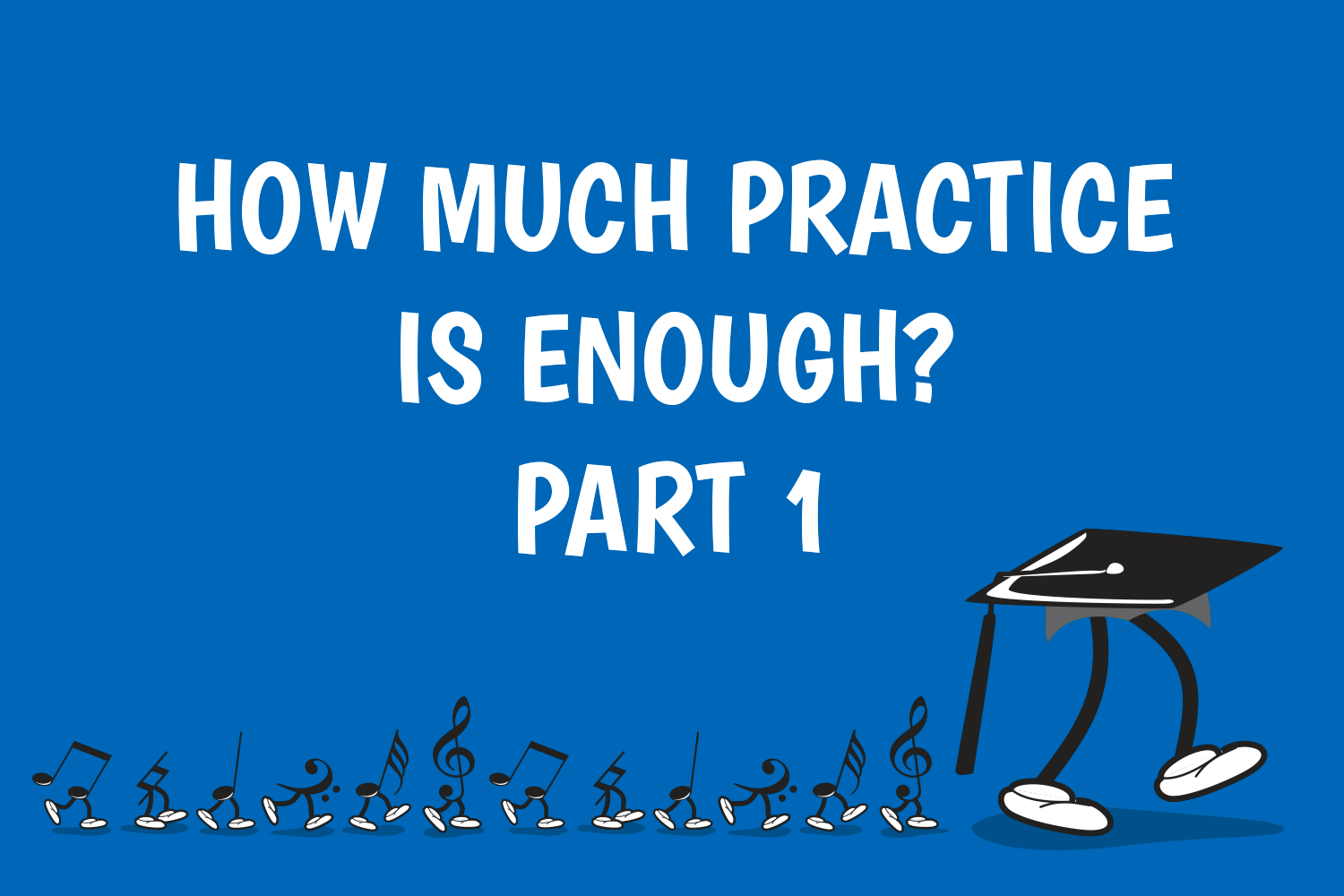How Much Practice is Enough? Part 1

Studies show that if you invest 10,000 hours of practice into pretty much any field, you will be a master in that field. This applies to musicians, sportsmen, chess players, computer geeks, anyone.
This comes from a book called ‘Outliers – The Story of Success’ by the economist Malcolm Gladwell. It’s a fascinating book that discusses all sorts of reasons why people become successful at what they do – accident of birth, opportunity, cultural legacy -but a big factor is how much time you put in, and he calls this the ’10,000 hour rule’.
My first reaction upon reading this was to mentally calculate how much piano practice I’d done in my life and figure out if and when I had ever reached the 10,000 hour mark. I kind of lost count somewhere in the memories of 3rd year Uni, but I think that basically yes I have certainly invested 10,000 hours along the way, yet for some reason I am not a world-class concert pianist. Oh.
Is this a flaw in Malcolm Gladwell’s theory? I don’t think so. The point of becoming a master of something also has to do with the rate the 10,000 hours are accumulated. Child prodigies who practise 6 hours a day will have done it in 5 years; chess champions have similar, intense exposure to the game. Perhaps if someone had told me, back in primary school, to hurry up with my 10,000 hours, I might have had a shot at the world-class concert pianist scene. (But really, probably not.)
Parents who are paying for piano lessons don’t necessarily have aspirations for their children to become world-class concert pianists. However, many parents have aspirations for their children to become ‘really good’ pianists, or at least to have achieved a reasonably high level before they ultimately give up (to pursue medicine or law). So this got me thinking… how many hours of practice gets us to a ‘reasonably high level’? Is there a number, an actual numerical goal that we could work towards, that would get us to about 8th grade piano?
Yes, there is. But before I discuss this number, the reason I’ve quoted 8th grade as the ‘reasonably high level’ is because 8th grade is so often perceived as ‘the end’. I have had many students who just want to get Grade 8 done because then they will be ‘finished’. This is not so. Pianists who have done 8th grade have not ‘finished’ their piano study. There are diploma examinations after 8th grade, if one still wishes to be in the examination system, and then of course there is the whole world of undergraduate and postgraduate study at University, piano competitions, overseas study… the list goes on.
But let’s get back to the number. In my teaching experience, the amount of practice needed, over a period of years, to be prepared enough for an 8th grade standard of exam is… about 1,500 hours.[1]
1500 hours of piano practice certainly sounds like a lot, but really when you think about it, that’s only 2 hours’ practice every single day for just over 2 years… woo hoo! 8th grade done in 2 years! How easy is that!
Oh, that’s right. Students don’t practice two hours every single day. In fact I’m lucky if most of my students practice two hours every single week. There’s always some good reason why practice hasn’t happened (see ‘The Seven Deadly Practice Excuses’). And teensy weensy beginner students certainly can’t practise that long. So here is a more realistic breakdown of how the 1500 hours would eventuate.
Let’s assume you are about 6 years old and have just taken up piano lessons. The teacher has asked that you practice 15-20 mins 4 times per week (perfectly reasonable). If you actually do this, after a couple of years or so you will have invested around 150 hours into piano practice.
150 hours is a good solid beginning. Now you and your teacher might be thinking about working towards a Preliminary Grade piano exam (so that you can join in with your friends in the playground when they are all talking about what grade they are up to).. So if we can say that 150 hours has seen us through the beginner stages, how much more practice do we need to put in to do well in a Preliminary grade piano exam?
A typical scenario is that of taking one year to attempt a piano exam. Most students who attempt Preliminary can do very well on 5 x 20 mins practices per week. Over a school year, allowing for holidays, this would probably amount to 80 hours of practice.
Now you are 9 years old, you’ve put in your 150 + 80 hours of practice and you’ve just received an A for your Preliminary exam. Well done! You are thinking about Grade 1. The requirements for Grade 1 are slightly more involved; there’s at least 15% more technical work to learn and the duration of the pieces is longer. So you will need to increase your practise time to about 90 hours for Grade 1 – assuming you still want to get an A!
If we take these scenarios and build up about 15% for each successive grade, we can work out a rough guide for how many hours it might take to achieve well in each grade and eventually reach the seemingly all-important and highly regarded GRADE 8. Please keep in mind that the following table, in fact this whole article, is a guide only!
| Grade | Total Hours | Practices per week[2] | Minutes per practice |
| Prelim | 80 | 4 | 25 |
| Grade 1 | 90 | 4 | 30 |
| Grade 2 | 105 | 4 | 35 |
| Grade 3 | 120 | 5 | 30-35 |
| Grade 4 | 140 | 5 | 35-40 |
| Grade 5 | 160 | 5 | 40-45 |
| Grade 6 | 285 | 6 | 40-45 |
| Grade 7 | 220 | 6 | 45-50 |
| Grade 8 | 250 | 6 | 50-60 |
The important point here for parents, students and teachers to have a realistic expectation of the commitment required to do well in exams. There’s no point forging ahead year after year without increasing the practice. Defining the preparation as a concrete number of hours’ practice needed can really help to assess whether you are ‘ready’ to take a particular exam.
The best way to keep track of how much practice has been done is to keep a practice log. By reviewing your logs regularly, you can see whether you’re doing enough preparation, or if you’re falling behind. Either way, it takes a lot of the guesswork out of wondering if you’ve done enough practice.
And one final word: This is a guide only!
Coming up in Part 2:
· Piano for Leisure vs Piano Syllabus
· Skipping grades
· Taking the pressure off preparing
· Preventing boredom with pieces
· Keeping motivated during the holidays
[1] The key word here is ‘about’. ABOUT 1500 hours. Not ‘exactly’ 1500 hours. One could argue that instead of ‘about’, it might be more appropriate to say minimum 1500 hours, but this is difficult to say. Everyone practices differently, with varying levels of efficiency, and this estimation is based on the practice habits and progress of the average Australian student. (

I only practice like 20 mins a week and my teacher asks me how long i take and i say 20 mins a day and she is still impressed lol
I am doing Grade 5 AMEB piano. I have definately noticed the increase of practice needed from Grade 4. My exam is next month so every current practice session is vital. As well as piano, I am also on the Grade 4 Blitzbook for theory, and it is SO much better then the standard AMEB one!
i am just 11 years old and iam doing grade 1 it is easy because i practice half an hour a day
i wish to become a great pianist
Good on you! 🙂
Hi Samantha,
Can you suggest a teacher in Southern California. I have been teaching myself for the last 3 years.
Hi Reuben I’m afraid that being in Sydney, that’s beyond my scope!